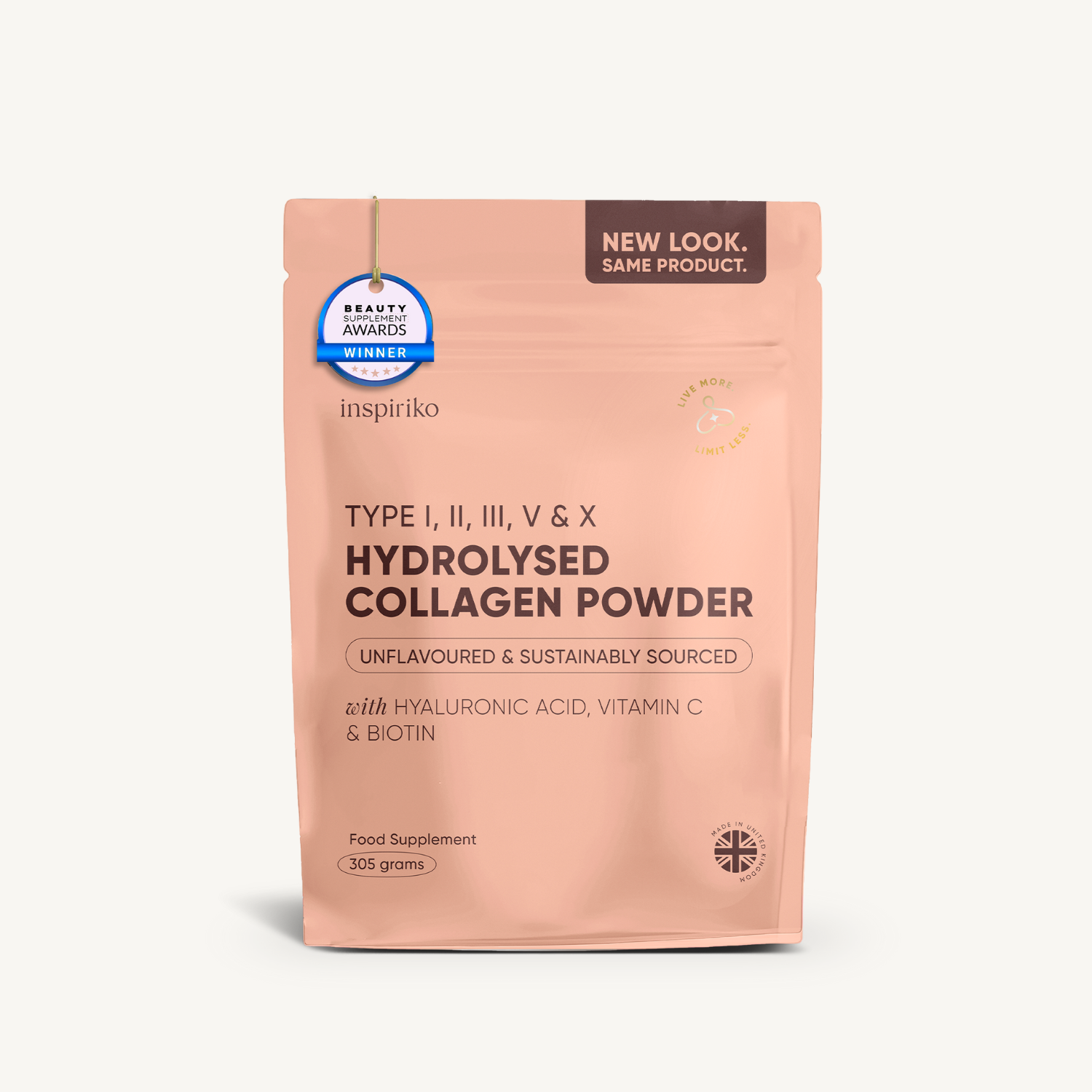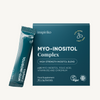Polycystic Ovary Syndrome (PCOS) is a health condition that affects millions of women around the world. Most of the time, it’s explained as a hormone problem, something that messes with your periods, causes acne, weight gain, or makes it hard to get pregnant (1).
But now, new research is showing something surprising: your gut might play a big role in PCOS, too. Yes, your gut! In recent years, scientists have started looking beyond hormones and insulin to explore the gut’s role in this condition. (2) And what they’re finding is pretty eye-opening. Your gut health might affect not just digestion, but also your hormones, metabolism, mood, and even fertility. Let’s break it down in simple terms.

What Is PCOS and How Is It Traditionally Understood?
PCOS (Polycystic Ovary Syndrome) is a condition that affects how a woman's ovaries work. It's one of the most common hormone disorders in women of reproductive age.
Common symptoms include:
-
Irregular periods or no periods at all
-
Acne or oily skin
-
Difficulty getting pregnant (infertility)
-
Excess hair growth on face/body (hirsutism
Traditionally, PCOS has been understood as a mix of hormonal imbalance, insulin resistance (when your body doesn’t respond well to insulin), and genetic factors. Doctors often focus on managing symptoms through birth control, insulin-sensitizing medications, or fertility treatments. But these conventional treatments don’t work for everyone. And many women still struggle with fatigue, mood changes, and stubborn weight gain even after starting treatment.
Wondering if PCOS runs in your family? Discover the genetics behind PCOS and learn effective ways to manage it naturally!
Easy Way to Support Your PCOS Symptoms
Inspiriko’s 5-in-1 PCOS Support is a tasteless powder supplement that helps manage PCOS symptoms by improving hormonal balance and insulin sensitivity. It contains myo-inositol, vitamins B6, B12, folic acid, and chromium. This blend supports regular cycles, mood, and metabolism, making it a convenient, science-backed addition to your PCOS care routine.

Understanding the Gut and the Microbiome
The gut isn't just where food is digested; it's also home to trillions of bacteria, viruses, and fungi. This collection of microorganisms is called the gut microbiome. A healthy gut microbiome helps digest food, produce vitamins, support the immune system, and even influence mood.
When the balance of good and bad bacteria in the gut is disturbed, it's called gut dysbiosis. Dysbiosis has been linked to various health issues like obesity, inflammation, autoimmune conditions, and even hormonal problems. For women with PCOS, gut dysbiosis may play a key role in making symptoms worse. Let’s see how.

Link Between Gut Dysbiosis and PCOS
Women with PCOS show reduced gut microbiota diversity compared to healthy women, along with an increase in inflammation-associated bacterial strains. This imbalance, or dysbiosis, can disrupt metabolism and promote chronic inflammation, contributing to insulin resistance, obesity, and other symptoms commonly seen in PCOS. (3)
Gut Barrier & Hormonal Links
Gut barrier dysfunction in PCOS may allow harmful substances to leak into the bloodstream, triggering chronic inflammation. Additionally, specific gut-derived metabolites, such as bile acids and short-chain fatty acids, have been linked to elevated androgen levels and insulin resistance, two major features of PCOS, highlighting the gut's influence on hormonal and metabolic regulation. (2)
Gut Bacteria Imbalance & Miscarriage Risk
Researchers found that women with PCOS have fewer good gut bacteria and more harmful ones that raise inflammation. This imbalance, along with high levels of an amino acid called isoleucine, may damage the uterus lining, making it harder to get pregnant and increasing the risk of miscarriage even in younger women. (4)
How Gut Health Impacts PCOS Symptoms
-
Hormonal Imbalances: The gut microbiome plays a key role in hormone regulation. Certain gut bacteria help break down and recycle hormones like estrogen. In women with PCOS, an unhealthy gut can disrupt this process, leading to imbalances in estrogen and increased androgen (male hormone) levels, which worsen symptoms like acne, irregular periods, and excess hair growth.
-
Insulin Resistance: In PCOS, gut dysbiosis disturbs the balance of key gut bacteria, which impairs glucose metabolism and contributes to insulin resistance. This imbalance reduces beneficial short-chain fatty acids and affects bile acid metabolism. As a result, blood sugar regulation worsens, increasing the risk of obesity, diabetes, and hormonal imbalances. (5)
-
Chronic Inflammation: A condition known as “leaky gut” allows harmful substances like LPS (lipopolysaccharides) to enter the bloodstream. This triggers chronic low-grade inflammation, which is commonly seen in PCOS and is linked to insulin resistance, weight gain, and worsened hormonal imbalance.
-
Mood & Cravings: The gut and brain communicate via the gut-brain axis. Imbalances in gut bacteria can affect serotonin and dopamine levels, contributing to mood swings, anxiety, and depression. They also influence appetite-regulating hormones, which may drive intense food cravings, especially for sugar and carbs, commonly reported in PCOS.

Can Improving Gut Health Help Manage PCOS?
-
Probiotics and Prebiotics: These beneficial microbes and their food sources help restore gut balance in PCOS. Specific strains like Lactobacillus and Bifidobacterium reduce inflammation, improve insulin sensitivity, and support hormonal regulation. Their effect on gut integrity and short-chain fatty acid production may also enhance fertility and metabolic health in PCOS. (6)
Looking for an easy way to get these gut-friendly powerhouses in one place? Love Thy Gut by Inspiriko combines science-backed probiotics and prebiotics in one powerful supplement - specially formulated to support gut health, overall wellness, and provide targeted digestive support for women with PCOS. -
Anti-inflammatory Diets: Eating foods rich in fiber, polyphenols (found in berries, nuts, and vegetables), and fermented foods like yogurt and kimchi helps reduce gut inflammation. This supports a balanced gut microbiome, which may improve insulin sensitivity and hormonal balance linked to PCOS.
-
Lifestyle Strategies: Good sleep, managing stress through mindfulness or exercise, and avoiding unnecessary antibiotics can protect gut health. These habits reduce inflammation and support hormone regulation, easing PCOS symptoms.
-
Supplements with Evidence: Certain supplements, such as inositol, berberine, and omega-3 fatty acids, have shown promising effects on both gut health and hormonal balance. Inositol improves insulin sensitivity, berberine modulates gut bacteria and inflammation, while omega-3s reduce systemic inflammation, together helping manage PCOS symptoms more effectively.

Tip: If you're looking for an easy way to support both gut health and hormone balance, check out Inspiriko’s range of women’s health supplements. Our products are thoughtfully designed to support hormones, digestion, and overall well-being—so you can feel more like yourself again.
Discover why natural supplements are a smart choice for managing PCOS
The connection between PCOS and gut health is clearer than ever. Research shows that gut dysbiosis can fuel inflammation, insulin resistance, hormonal imbalances, and even fertility issues in women with PCOS.
Addressing gut health through probiotics, prebiotic-rich foods, anti-inflammatory diets, lifestyle changes, and targeted supplements can be a powerful way to ease symptoms naturally. While conventional treatments still play a role, improving gut balance offers a complementary, holistic approach. By taking care of your gut, you’re not just supporting digestion; you’re also nurturing your hormones, metabolism, mood, and overall well-being in the fight against PCOS.
FAQs
Can PCOS be caused by poor gut health?
Which probiotics are good for PCOS?
Can healing the gut improve fertility in PCOS?
How fast can gut health improvements impact PCOS?
Should I take supplements or change my diet first?
Related Products
References for the blog
-
Cleveland Clinic, (no date). Polycystic Ovary Syndrome (PCOS).
Available at: https://my.clevelandclinic.org/health/diseases/8316-polycystic-ovary-syndrome-pcos -
Kumar, A., Smith, J., & Lee, R., 2024. Title of the article. Frontiers in Microbiology, [online] 15, p.1524521.
Available at: https://www.frontiersin.org/journals/microbiology/articles/10.3389/fmicb.2024.1524521/full -
Li, C., Cheng, D., Ren, H., & Zhang, T., 2025. Unraveling the gut microbiota’s role in PCOS: a new frontier in metabolic health. Frontiers in Endocrinology, 16.
Available at: https://www.frontiersin.org/journals/endocrinology/articles/10.3389/fendo.2025.1529703/full -
Zurowska, A., 2025. ESHRE 2025: Study Identifies Gut Bacteria Imbalance Linked to PCOS Miscarriages. European Medical Journal.
Available at: https://www.emjreviews.com/reproductive-health/news/eshre-2025-study-identifies-gut-bacteria-imbalance-linked-to-pcos-miscarriages/ -
Sun, Y., Gao, S., Ye, C., & Zhao, W., 2023. Gut microbiota dysbiosis in polycystic ovary syndrome: Mechanisms of progression and clinical applications. Frontiers in Cellular and Infection Microbiology, [online] 13, p.1142041.
Available at: https://pmc.ncbi.nlm.nih.gov/articles/PMC9998696/ -
Ramzan, H., Bukhari, D.A., Bibi, Z., Arifullah, Isha, Nawaz, A. & Rehman, A., 2024. Probiotic supplement for the treatment of polycystic ovarian syndrome. Pharmacology & Therapeutics, 266, p.108785.
Available at: https://www.sciencedirect.com/science/article/abs/pii/S0163725824002055 -
Corrie, L., Awasthi, A., Kaur, J., Vishwas, S., Gulati, M., Kaur, I.P., Gupta, G., Kommineni, N., Dua, K. & Singh, S.K., 2023. Interplay of Gut Microbiota in Polycystic Ovarian Syndrome: Role of Gut Microbiota, Mechanistic Pathways, and Potential Treatment Strategies. Pharmaceuticals (Basel), 16(2), p.197.
Available at: https://www.ncbi.nlm.nih.gov/pmc/articles/PMC9967581/





